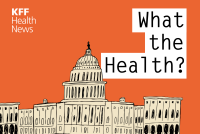Latest Morning Briefing Stories
Got Milk in School? Farmers Fight Health Advocates Over the Creamy ‘Whole’ Variety
It has been over a decade since whole milk was served in schools through the National School Lunch Program, after U.S. government dietary guidance effectively banned it. But dairy farmers, some health experts, and members of Congress say it’s time to bring it back.
Proposed PFAS Rule Would Cost Companies Estimated $1B; Lacks Limits and Cleanup Requirement
A proposed Environmental Protection Agency rule calls for companies to disclose PFAS manufactured or imported since 2011. The chemical industry is upset because such compliance would cost an estimated $1 billion, while environmental health advocates worry because the rule wouldn’t ban the chemicals outright.
CDC to Reduce Funding for States’ Child Vaccination Programs
Citing the recent debt ceiling deal, the CDC is trimming its funding to child vaccination programs that focus on communities vulnerable to disease outbreaks. The cuts come despite data showing the percentage of children getting vaccinated has dropped in recent years.
More States Legalize Sales of Unpasteurized Milk, Despite Public Health Warnings
Distrust of public health authorities, who say drinking raw milk is dangerous, fuels demand for unpasteurized milk products, leaders on both sides of the issue say.
As Low-Nicotine Cigarettes Hit the Market, Anti-Smoking Groups Press for Wider Standard
The first FDA-authorized cigarettes with 95% less nicotine than traditional smokes will go on sale in California, Florida, and Texas starting in early July. Anti-smoking groups oppose greenlighting just one plant biotech’s products and instead urge federal regulators to set a low-nicotine standard for the entire industry.
New Charleston Museum Nods to Historical Roots of US Health Disparities
The $120 million International African American Museum that opened this week in Charleston, South Carolina, allows visitors to step back in history at Gadsden’s Wharf, where tens of thousands of enslaved Africans arrived in America, the genesis of generations of health disparities.
E-Cigs Are Still Flooding the US, Addicting Teens With Higher Nicotine Doses
The FDA, Justice Department, and White House have failed to act as vapes with kid-friendly flavors like cotton candy or gummy bears proliferate.
Más adolescentes adictos a cigarrillos electrónicos con altas dosis de nicotina
El vapeo se ha disparado hasta convertirse en una industria de $8.2 mil millones, y los fabricantes están inundando el mercado con miles de productos que pueden ser mucho más adictivos.
In this special episode of KFF Health News’ “What the Health?” host and chief Washington correspondent Julie Rovner leads a rare conversation with the current and two former secretaries of Health and Human Services. Taped before a live audience at Aspen Ideas: Health, part of the Aspen Ideas Festival, in Aspen, Colorado, Secretary Xavier Becerra […]
Black, Rural Southern Women at Gravest Risk From Pregnancy Miss Out on Maternal Health Aid
A federal program meant to reduce maternal and infant mortality in rural areas isn’t reaching Black women who are most likely to die from pregnancy-related causes.













